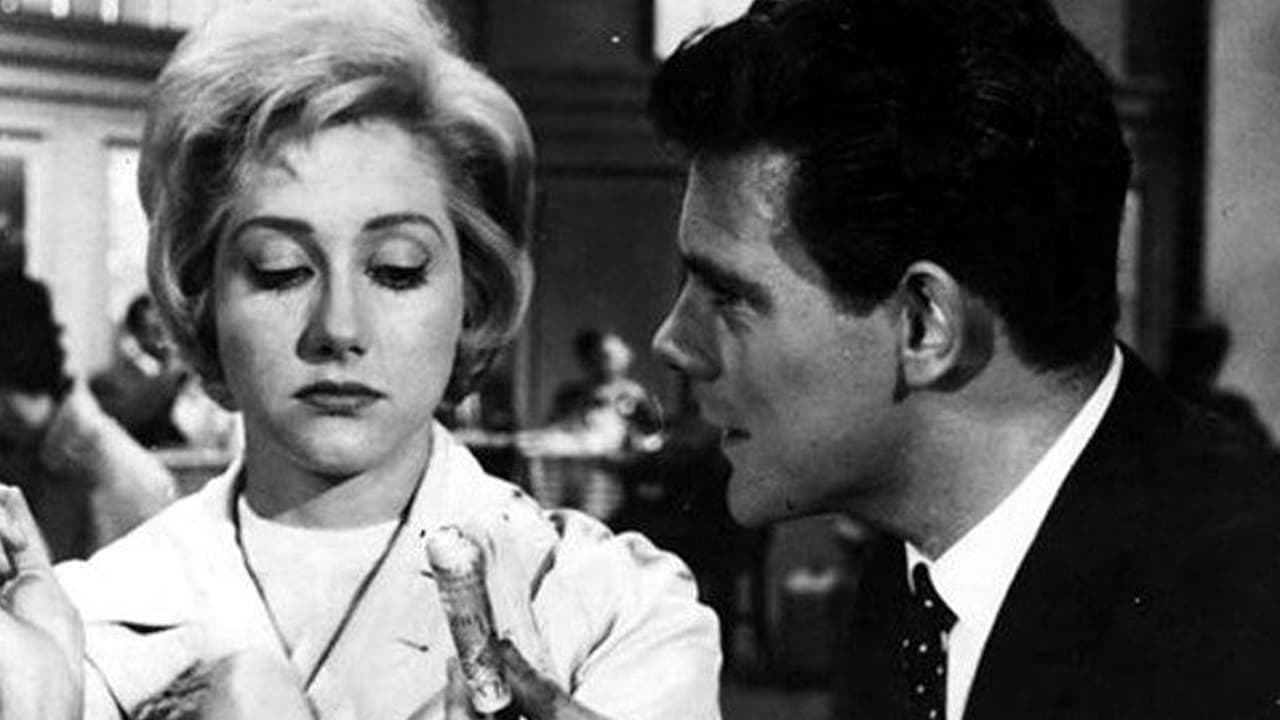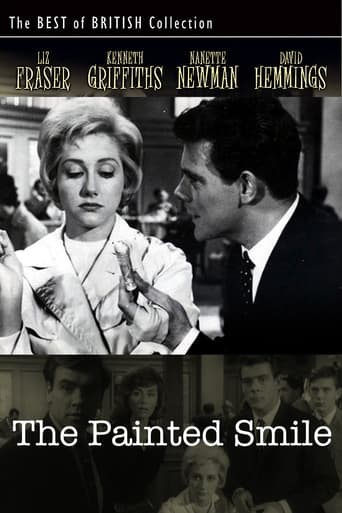Linbeymusol
Wonderful character development!
Supelice
Dreadfully Boring
AutCuddly
Great movie! If you want to be entertained and have a few good laughs, see this movie. The music is also very good,
PiraBit
if their story seems completely bonkers, almost like a feverish work of fiction, you ain't heard nothing yet.
kidboots
Unlike "Rag Doll" (featured in "The Best of British Double Feature") the dinky pop songs are pretty intrusive, do not further the narrative and seem to turn up in the most unlikely places ie blaring from a bakery's loud speaker of all places!! It also doesn't help having one of the leads completely unsympathetic - Liz Fraser's career consisted mainly as the dumb blonde in a few of the Carry On films, here she was straight and gritty but it didn't make for a warm characterization. She is Jo, a prostitute who wants to escape the rackets with Mark, the man she is two timing Kleinie with but with Kenneth Griffith playing the club footed hoodlum she has Buckley's chance of making a new life for herself. She goes to the club for one last pick-up but after bringing back young industrial design student Tom (Tony Wickert) to her flat for a shakedown, she realises Kleinie has already been there and murdered Mark in her bedroom.After this suspenseful start the film dives into the realms of unbelievability - Jo shows her true colours by forcing Tom to dispose of the body, threatening that if he goes to the police she will accuse him of the crime as his drunken antics have left fingerprints and mess all over the flat. He drives out of London but his erratic driving brings him to the attention of the police and causes him to leave the car with the body in the back seat!! Next morning finds him Britain's most wanted man!! Of course he runs straight back to his understanding fiancée Mary - beautiful Nanette Newman brings a breath of fresh air to what was becoming a stale movie. She does question why he went off with the girl from the club and his excuse that he wanted to break free one last time has the old double standard rearing it's ugly head when she queries "what if I wanted some freedom for myself"!!!Only the initial shot of an unknown man climbing the stairs and the ending, among the bleak dunes, elevate this movie from the run of the mill. Craig Douglas was the singer and at the time was in vogue as a pop idol. He had had a lead role in "It's Trad, Dad" and this was his second and final appearance. Soon to go on to bigger and better things was David Hemmings, looking about 12!!!, who played one of Tom's enthusiastic night club companions.
malcolmgsw
This is one of the later efforts of Mancunian films.Unfortunately the plot is underdeveloped ,cliched and full of holes.A big problem is that Kenneth Griffiths,a fine comedy actor,exudes about as much menace as Mickey Mouse.So any menace he exudes is merely in the script not in the actual film.Having stabbed his victim he leaves the knife in the body.Then when he is found the student takes the knife out of the dead body leaving his fingerprints all over the knife.To add to further disbelief Fraser manages to convince him that if he doesn't help dispose of the body the police will be told that he was the murderer. The climax is almost as unreal.The pair are chased by Griffiths over what looks like sand dunes.Griffiths shoots Frasr,runs out of bullets and drops his gun to surrender to the police.Rather tame and anti climatic like much of this film.
jamesraeburn2003
London: Mark (Peter Reynolds) and Jo (Liz Fraser) are two small time crooks who fall foul of big shot gangster, Kleinie (Kenneth Griffith). While Jo is at a nightclub looking for a suitable victim for their blackmail scam, Kleinie shows up at their flat and stabs Mark to death as a warning to others to keep off his territory. Meanwhile, back at the club, Jo meets three students, Tom (Tony Wickert), Glynn (Ray Smith) and Roy (David Hemmings). Jo sizes up Tom (who is drunk) as a potential victim and lures him back to her flat. Here she receives a phone call from Kleinie who tells her that she has "some rubbish to dispose of" and warns her not to implicate him. They discover Mark's body and foolishly, Tom pulls the knife out. Jo threatens to tell the police that he did it unless he disposes of the body for her. They put the body into the boot of Tom's car and he drives off with it. His reckless driving prompts a police car to give chase and in panic, Tom simply abandons the car and runs off. Not only is Tom now wanted by the police but Kleinie and his henchman are also looking for both him and Jo in order to murder them and divert suspicion away from himself...A sadly tedious British b-pic crime drama despite the best efforts of director Lance Comfort and his cast. The main problem is the script in which the characters are so thinly sketched that it is very hard to sympathise with the hero as he tries to clear his name and at the same time avoid certain death at the hands of Kleinie (played by the versatile Kenneth Griffith who gives the best performance in the film) and his minions. There is one moment of irony in the script when the three students, Tom, Glynn and Roy declare that their night out in Soho is to "break loose before society swallows us up and set us on a long walk to the grave". In Tom's case it looks like being a pretty short walk after getting into the predicament he has. Director Comfort's staging of Mark's murder is fairly imaginative and provides the only few moments of tension in what is otherwise a pretty mediocre film. The singer in the nightclub is Craig Douglas who enjoyed a string of hits like Only Sixteen, A Hundred Pounds Of Clay and When My Little Girl Is Smiling at the time this was made. But the two songs featured here, Painted Smile and Another You are not hit parade material.
DanielKing
There is something engaging about these B-movies and usually one or two points of interest. In this instance that comes from seeing Liz Fraser in a leading role. It would be labouring the point to say she is required to stretch her acting muscles here, and in fact she is required more to squeeze her gargantuan bosom into tight negligees, but I always welcome the chance to see one of Britain's comedy stalwarts in a straight role. In fact the film has a few faces who went on to better things, including an almost unrecognisable Griffith as the cheif villain and a fresh-faced Hemmings before he turned into the corpulent Ken Russell-lookalike he is today. There is also a chance to see Nanette Newman doing what in an early 1960s B-movie passed for acting; she is beautiful though.As far as being an entry in the British crime genre is concerned the film is rather disappointing. The synopsis I had led me to believe the plot concerned rival gang bosses fighting over a girl. The truth is that gangsterism is used purely as a backdrop for a series of events which befall the student. In fact, despite Fraser's top billing, the film shifts its focus away from Jo Lake and settles on Tom, as soon as he gets the corpse into his car. In that way the film resembles not so much a gangster film, or even an underworld film, as what was called in the 1980s a 'yuppie nightmare' movie, in the manner of AFTER HOURS or SOMETHING WILD.Despite the strides towards realism which had been made in the genre this film insists on using a very dated portrayal of crimelords. Kleinie is coded as anything but a macho figure: he has a club foot, has an effeminacy about him, is clearly not from the working classes, and conducts operations (about which we learn nothing) from an oak-panelled office lined with books. Furthermore he is played by Kenneth Griffith, not an actor noted for his physical presence or menace.Having said all that the film does have its own charm and it is remarkable to think, at a time when film production here has slumped, that Britain once had such a thriving industry and produced second features, such as this, to support the main film.

